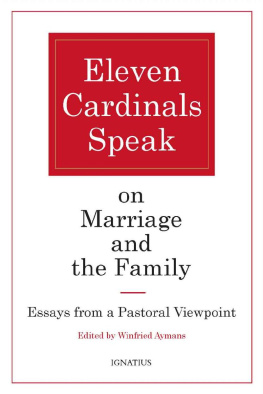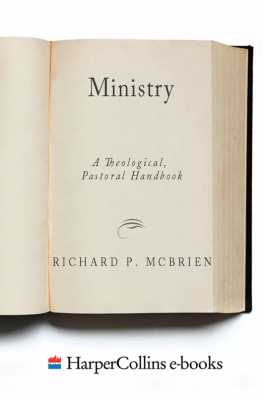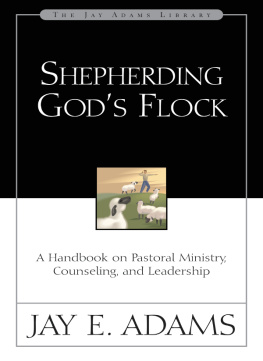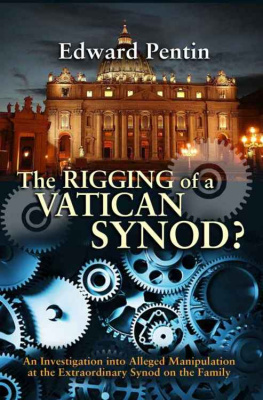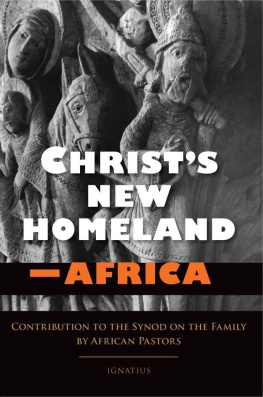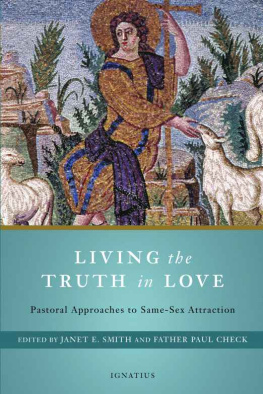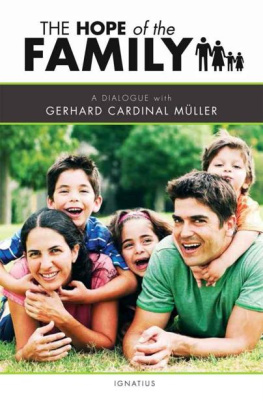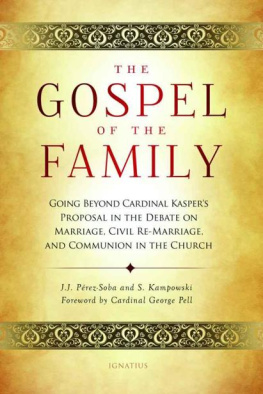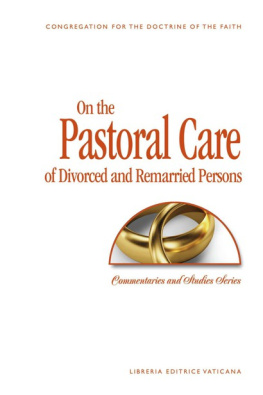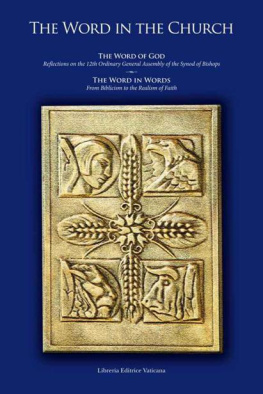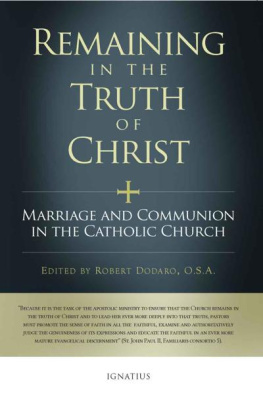ELEVEN CARDINALS SPEAK
ON MARRIAGE AND THE FAMILY
Eleven Cardinals
Speak on Marriage
and the Family
Essays from a pastoral viewpoint
Edited by
Winfried Aymans
Translated by Michael J. Miller et al .
IGNATIUS PRESS SAN FRANCISCO
Unless otherwise noted, Scripture quotations (except those within citations) have been taken from the Revised Standard Version of the Holy Bible, Second Catholic Edition, 2006 by the Division of Christian Education of the National Council of the Churches of Christ in the United States of America. All rights reserved.
Excerpts from the English translation of the
Catechism of the Catholic Church , second edition,
1994, 1997, 2000 by Libreria Editrice Vaticana-United
States Conference of Catholic Bishops, Washington, D.C.
All rights reserved.
Cover design by Roxanne Mei Lum
2015 by Ignatius Press, San Francisco
All rights reserved
ISBN 978-1-62164-087 (PB)
ISBN 978-1-68149-677-1 (EB)
Library of Congress Control Number 2015947019
Printed in the United States of America
CONTENTS
Mercy and Conversion
Marriage and Family: A Covenant with God in His Church; A Malankara Perspective on Marriage and Family
Without Rupture or Discontinuity
Reflections on the Family
Can Divorced and Civilly Remarried Persons Receive Communion ?
Marriage PreparationThe Challenges of Today
Marriage in Our Contemporary World: Pastoral Observations from an African Perspective
Witness to the Truth of the Gospel of the Family: An Urgent Pastoral Challenge for the Church to Set Out on the Journey of the Third Millennium
The Gospel of the Family in the Secularized West
Marriage Preparation in a Secularized World
Christian Marriage: The Reality and Pastoral Care
PREFACE
It is the heartfelt desire of Pope Francis that the Church reflect on the current situation of marriage and the family and to develop, to the extent possible, helpful recommendations for overcoming the difficulties. In order to underscore the importance of this topic, he first of all convoked two synods of bishops that are thematically interconnected but organized to include some different personnel, so as to create an opportunity for a wider public discussion over a longer period of time.
Of course it is not true that it has just now become evident how important it isespecially for the Church, tooto deal with the topic of marriage and family. We need only recall here the Second Vatican Council with its Pastoral Constitution, Gaudium et spes (articles 47-52), and also the Fifth Ordinary Synod of Bishops in 1980, which led to the great Post-Synodal Exhortation Familiaris consortio by Pope John Paul II, who meanwhile has been raised to the honors of the altars. This document can by all means be described as the Magna Carta of the Churchs understanding of marriage and family in our time.
Yet since then the times have not stood still. In particular, in the so-called Western world, both the concept of marriage and the understanding of the family have been dissolving in an unprecedented way. Even in the twentieth century, there were strong effortsat least on the Churchs partnot to let the chasm between the ecclesiastical and the various secular arrangements of marriage and family become too deep. The two sets of arrangements have drifted apart, nonetheless, and the main starting point of that trend was the ever-increasing frequency of civil law divorces. By now, though, the very concepts of marriage and family are in many respects no longer unambiguous in society, and to this extent they have become dubious. Hence it is all the more necessary for the teaching of Jesus Christ not to come into question and for Church teaching, unabridged, to find its indubitable expression in our days as well.
The notions that prevail, on the one hand, in secular society and those that result, on the other hand, from the Churchs faith have drifted apart, and, because of this, problematic situations and conflicts are increasing. These have become noticeable above all in pastoral care. Numerous publications by very highly qualified authors about theological principles and foundations have appeared even in recent days. This prompted the thought of enriching the relevant discussion with several essays that aim not so much to continue the scholarly debate as to consider practical questions mainly from a pastoral perspective.
Nevertheless, in order to lend greater weight to the contributions and also to create greater interest, cardinals of the Holy Roman Church were invited exclusively to write essays for the present book. Most of them gained their experience in their important responsibility as diocesan bishops of prominent local Churches, some in other significant ecclesiastical duties. All of them, however, became familiar with questions about marriage and family life through their priestly ministry. The authors were asked, not to enter into further systematic discussions, but to write in the form of an essay their own reflections about their personal experience and perspective. All the authors deserve our respect and thanks for the fact that they took the trouble to compose their essays within a short time, alongside their official duties.
The result stimulates reflections of an entirely different sort. The practical conclusions are sometimes based on more fundamental reflections of a philosophical or theological nature; others presuppose this foundation and follow simply from practical experiences. In keeping with the essay format of the contributions, it seemed appropriate for publication not to try to group the essays by topic for publication, but simply to arrange them in alphabetical order by the authors names.
Now we will introduce the individual essays, while calling attention to the points emphasized in each.
Cardinal Cafarra , the archbishop of Bologna, addresses a topic that has become especially relevant recently, thanks to Pope Francis himself: Mercy and Conversion. The author recognizes that without due carefulness, terms like mercy can easily be exploited. Therefore, he shows all sorts of things that must be included when we reflect on the divine and human dimensions of mercy.
The major archbishop-Catholicos of the Syro-Malankara Church of Trivandrum and currently the president of the Catholic Bishops Conference of India, Cardinal Cleemis , limits himself to one aspect of his topicthe mystery of sacramental marriagein his short essay entitled Marriage and Family: A Covenant with God in His Church.
If a priest recognizes that a married couple is living in an irregular or failed marital situation, he cares for the souls of the parties concerned and encourages them to participate in the life of the Church as much as possible. In marriage preparation courses, young people are instructed in the basic questions of the faith, the sacraments, and Church life. Premarital cohabitation is very rare. When a homosexual inclination of one of the partners in a married couple comes to light and is not corrected, then the innocent partner must be helped, even to the point of declaring the marriage invalid. In the Indian Christian tradition, marriage is regarded not only as a matter between the two partners, but as being embedded in society as a whole. Moreover, the author explains the nature of arranged marriages. The most important catechesis is to make the wedding ceremony itself as solemn as possible. The bride and groom receive the sacramentaccording to the tradition of the Eastern Churchesthrough the priest; they are not the ministers but the recipients of the sacrament. Furthermore, the author explains several symbols within the context of the liturgy, whereby prominent significance is assigned to the example of Christs covenant with the Church.
Next page
